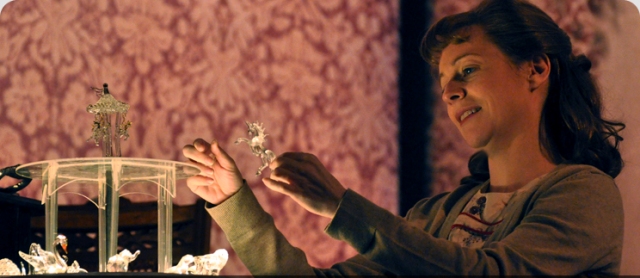The UD REP Ensemble stages Tennessee Williams’ THE GLASS MENAGERIE in a set resembling a shadow box. The personalities of the characters cast shadows over one another as well. The themes are heavy: failures of capitalism, failures of the family structure and broken promises by fathers and sons.

Carine Montbertrand as Laura in UDEL REP's production of THE GLASS MENAGERIE, running in Newark, DE through February 27. (Photo by N. Howatt)
It is considered Williams’ most autobiographical play. His birth name was Thomas and the scene is a dingy apartment in St. Louis, similar to his own childhood environs. The son and brother in the play Tom (Michael Gotch) is the narrator and the tale is a recollection of his memories with his Mother and his sickly and mentally ill sister Rose. In the play the Mother’s name became Amanda (Kathleen Pirkl Tague) and Rose would become Laura (Carine Montbertrand).
Amanda’s husband abandoned the family long ago. Although a survivor and a pragmatist, Amanda yearns for the illusions and comforts she remembers from her days as a fêted Southern belle. She yearns especially for these things for her daughter Laura, a young adult with a crippled foot and tremulous insecurity about the outside world.
Tom works in a warehouse, doing his best to support them. He chafes under the banality and boredom of everyday life and spends much of his spare time watching movies in cheap cinemas at all hours of the night. Amanda is obsessed with finding a suitor for Laura, who spends most of her time with her collection of glass animals, both cold and fragile.
Tom eventually brings a nice boy named Jim home for dinner at the insistence of his mother, who hopes Jim will be the long-awaited suitor for Laura. Laura realizes that Jim is the man she loved in high school and has thought of ever since. After a long evening in which Jim and Laura are left alone by candlelight in the living room, Jim reveals that he is already engaged to be married, and he leaves. Amanda is furious with Tom, accusing him of knowing beforehand this night would be a waste. The outburst is the turning point for Tom. After a lifetime of boredom, mediocrity and dashed dreams, he comes to a crushing decision. He walks down the fire escape from the apartment for the last time to seek his fortune on his own, never to return.
This was a different MENAGERIE than Aisle Say has past witnessed. Normally Laura is on stage continually, seemingly ‘Rain Man-esque ‘possessed’ by her inanimate figurines. Also, there is more laughter in this production. One can argue that compelling drama and riveting dialogue are the parents of great laughter. (Gotch confided in me afterwards that, due to the weather, this was the first performance in front of an audience. The cast had no clue about audience reaction.)
While it is Tom’s memory that creates the chassis, Amanda’s character provides both steering and motor for the vehicle. Pirkl gives us a flawless portrayal of a woman on the edge of desperation: eking out a bare subsistence, fixated on a suitor for Laura and fantasizing on a past life with a handsome and charming husband (whose portrait dominates the wall).
We hear in Gotch’s Tom the despair and frustration of a misbegotten life. Gotch translates his words into his physicality. We hear the resignation in his voice.
Montbertrand plays against character as Laura. (At least against characters Aisle Say has seen her play the past three years!) She does understatement exceedingly well; a slight turn of the head to signify insecurity, a glazed expression to express less than full mental acuity.
Jim (Erik Mathew) is the sole PTTP actor in the show, the others being full time REP Ensemble. He brings great energy to the role and, in his character, an Everyman type of sanity which plays against the repressions and hangups of the other three. He is a big man and exerts strong stage presence.
THE GLASS MENAGERIE
by Tennessee Williams
through February 27, 2011
University of Delaware
Resident Ensemble Players (REP)
Roselle Center for the Arts
110 Orchard Road
Newark, DE
302.831.2204
www.pttp.udel.edu


